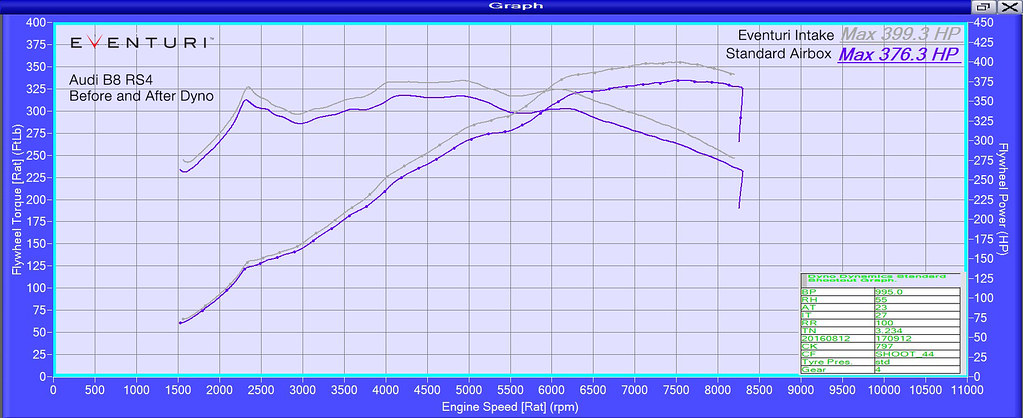AUDI B8 RS5 / RS4
Performance Gain: 15-20hp, 12-18ft-lb (At The Wheels)
Some of the photos above show our optional carbon engine and slam panel covers found HERE
The Audi RS5/RS4 Eventuri intake was developed after consultation and support from RS5 enthusiasts. We have completely re-engineered the inlet track from the ducts to the filters and the inlet tubes. The restrictive stock airboxes and duct feeds have been replaced with a highly efficient – fully sealed system with smooth transitions to allow the airflow to remain full and laminar. The resulting performance gains, sound and aesthetics are industry leading for this platform.
The Eventuri Difference
The RS5/RS4 Eventuri system uses our Patent Pending Carbon fibre Housings which provide an aerodynamically efficient airflow path from the filters to the throttle bodies. Not just another cone filter with a heat shield but a unique design which invokes the Venturi affect. You can read more about the housing design and how it works HERE
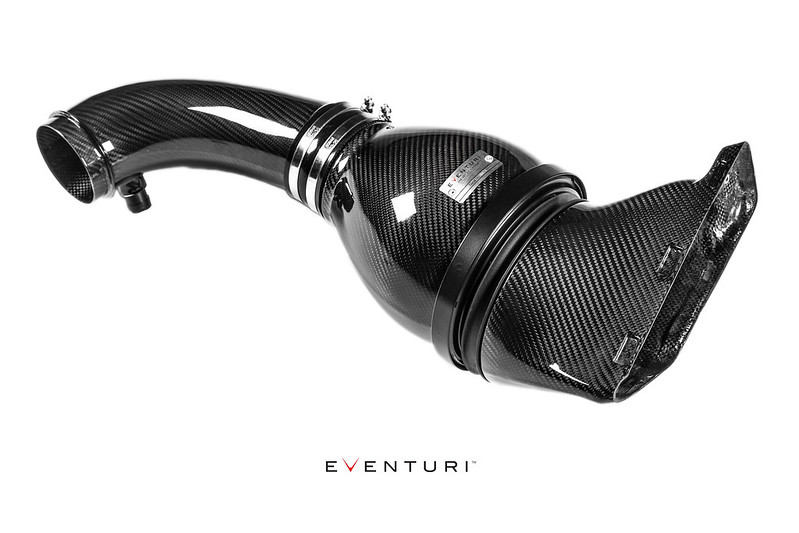
The Eventuri B8 RS5/RS4 intake system consists of a number of components engineered to perform a specific purpose and fabricated to the highest of standards. Here are the details for each component and the design ethos behind them:
Each intake system consists of:
- 2 Carbon Fibre Venturi housings
- 2 High Flow Double Cone Air Filters
- 2 Aluminium Cowls for smooth airflow entry
- 2 Carbon Fibre Inlet Tubes with integrated breather attachments
- 2 Carbon Fibre Intake Ducts
- 2 Carbon Fibre Front Scoops
- 2 Laser Cut Stainless Steel Scoop Extension Plates
- Laser Cut Heat Shields with Heat Reflective Lining
- High Quality Silicon Couplers and OEM Spec Hose Clamps
- Breather Hose Removal Tool
Carbon Intake Housing Assemblies
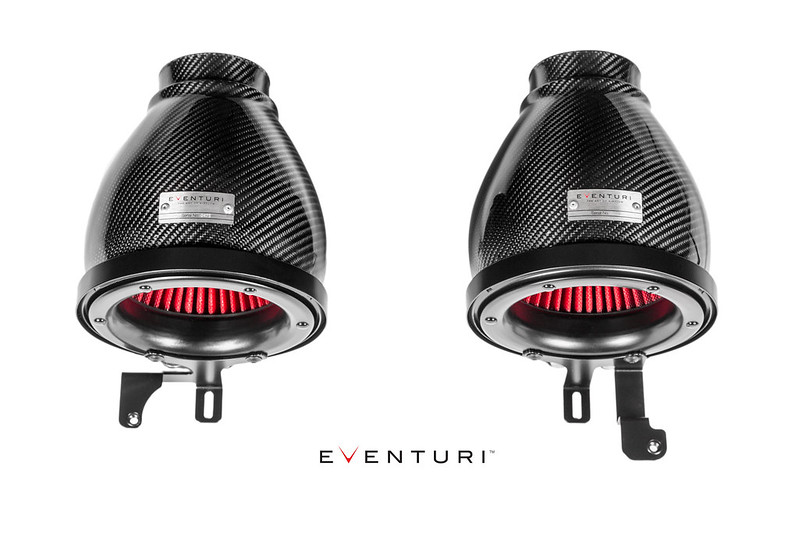
The filter housings comprise of the high flow filters, aluminium cowls, V-Band clamp, laser cut brackets and the carbon pods themselves. The carbon pods shroud the reverse mounted filter and smoothly shape the airflow down to the intake tubes. This smooth reduction in cross sectional area invokes the Venturi effect where the airflow accelerates whilst maintaining laminar conditions. It can be thought of as a large velocity stack - below is a diagram to show the comparison between our patent pending design and a regular intake system. Further details can be read in the Technology page.
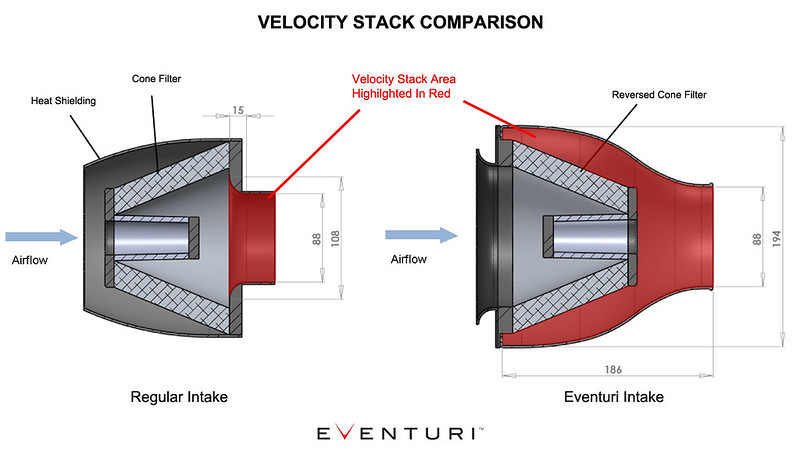
Carbon Fibre Intake Ducts

The ducts channel ambient air from the scoops to the filter housings. They fit inside the OEM ducting system and smoothly transition to the circular filter housing shape. In order to ensure a good seal against engine bay heat - the ducts also have a flexible rubber edging around the openings which press against the filter housings creating the desired seal yet allowing the housings to move with the engine. These geometrically complex pieces are a key part of our B8 design.
To illustrate - here is the left hand side intake assembled as it would be in the engine bay with the tube and duct:

Carbon Fibre Intake Tubes

Our intake tubes are again crafted from 100% prepreg carbon fibre. Each tube has an integrated breather tube insert which is CNC machined from aluminium. The tubes smoothly carry the airflow to the throttle bodies by ensuring there are no sharp or sudden bends. The smooth bend geometry ensure laminar flow is maintained from the filters to the exits.
Carbon Fibre Air Scoops
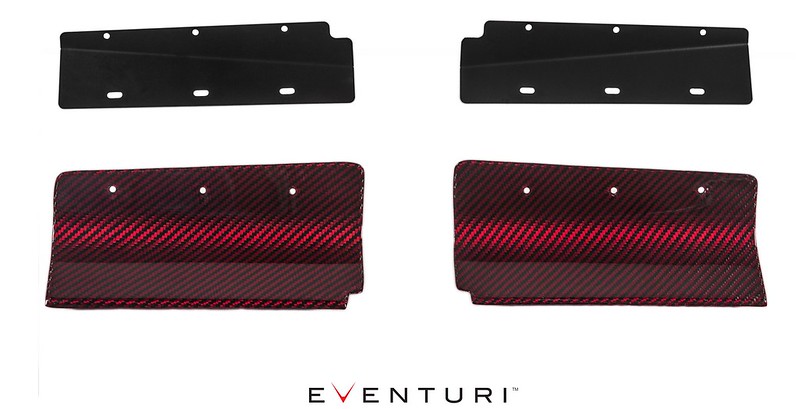
The final carbon components in this system are the front scoops - essential to direct ambient air to the ducts and then to the filters.
The scoops were designed with a constant bend radius for maximum efficiency in directing the incoming air to the duct openings. They allow the inlet air temperatures to be as low as possible and increase the rate of drop in IATs after the system is heat soaked during a standstill.
Heat Shields
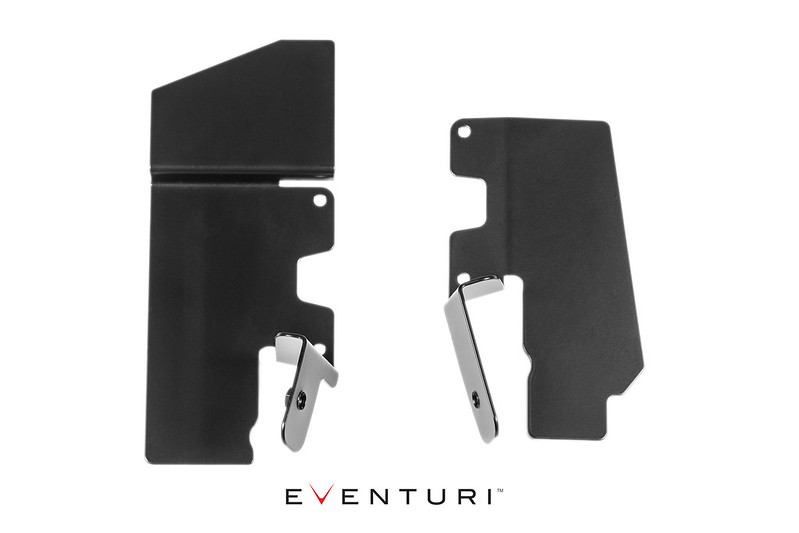
The heat shields serve two purposes - to deflect heat from the exhaust manifolds and to provide a mounting surface for the housings. Laser cut from stainless steel, the shields provide a strong mounting point to secure the housings to. Furthermore, by using a class leading reflective material on the reverse face, the shields effectively block radiant heat generated by the exhaust manifolds thus reducing the heat soak onto the carbon components.
All the components come together in the engine bay to produce a genuine improvement in the driving experience as well as providing an incredible visual display of form and function in complete harmony. To add the finishing touches to the engine bay we have also produced matching carbon/kevlar engine covers and slam panel covers. These items can be found HERE
Optional Engine and Slam Panel Covers:

Below is an independent dyno graph showing the comparison between the Eventuri and the stock airboxes on a standard RS5. As you can see, power is increased through a large portion of the rpm range not just at the peak. This translates on the road to increased part throttle and full throttle response with the car pulling much more eagerly to the redline. The testing was done on the same day back-to-back and temperatures were monitored to ensure consistency. The car was tested firstly with the stock intake - hood closed. We then left the car on the dyno and installed the Eventuri. The car was then run again - hood closed. Several runs were carried out with both configurations to get a consistent result. Since dyno figures vary between runs - for fairness we chose to publish figures using the highest stock run VS highest Eventuri run. Here you can see the 2 best runs with both configurations.
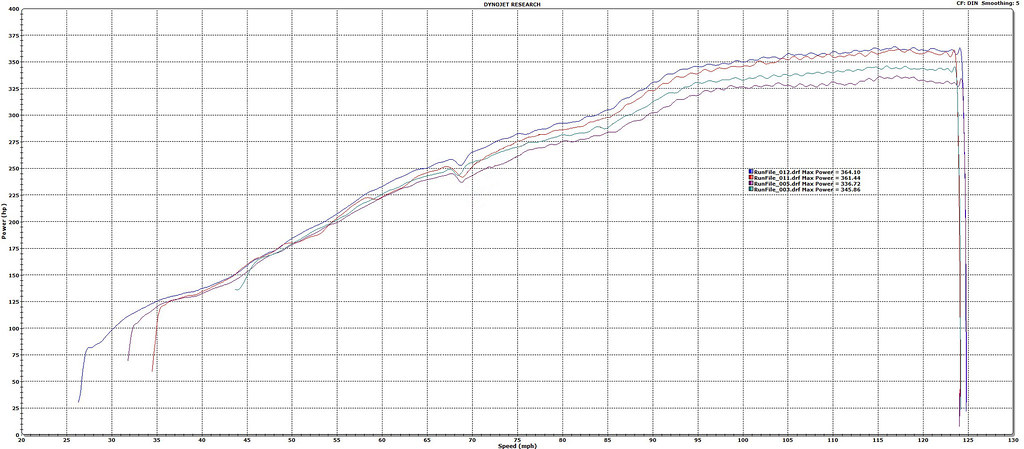
We could have shown the highest figure achieved with the Eventuri VS the lowest achieved with the stock setup, however this would not be a fair comparison. Just to illustrate the variation, here is the graph showing highest Eventuri VS lowest stock which was recorded on the day showing a gain of over 32hp at the wheels.
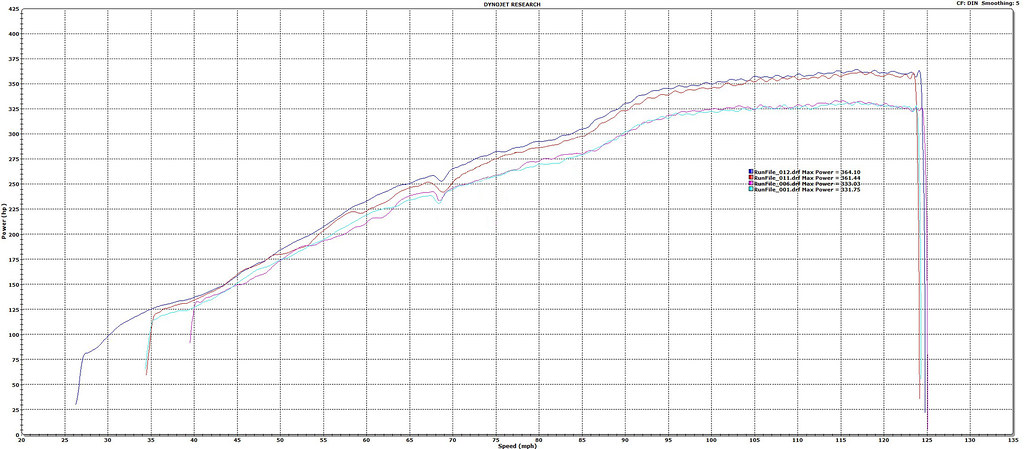
Here is another graph showing the difference between the stock airboxes and the Eventuri intake system - this time on a B8 RS4. Dyno runs were done on the same day and the car remained strapped to the dyno during installation to ensure strap tensions were the same for both tests. Here we can see a considerable gain in both torque and power - with 25ft-lb toque gained in the midrange and 25hp gained before peak rpm.
